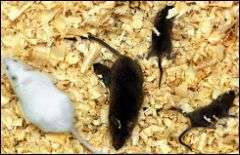July 12, 2011 report
Mice with human livers make pharmaceutical testing more accurate

(Medical Xpress) -- In a new report published in the Proceedings of the National Academy of Sciences, a team of researchers reveal a new miniature artificial human liver that can be implanted into mice to better enable testing of new drugs and how humans will metabolize them.
When it comes to pharmaceutical research, using mice to test drugs has had its limitations because the liver of a mouse reacts differently than a human liver. Scientists have been able to make a mouse liver more human-like by injecting human cells into immunodeficient mice with damaged livers.
This new artificial human liver was developed by a team from Massachusetts Institute of Technology and led by biomedical engineer Sangeeta Bhatia. The miniature liver measures 20 millimeters and is implanted into healthy mice.
The human ectopic artificial livers, or HEALS as they call them, are created by co-culturing primary human hepatocytes, or human liver cells, with stabilizing mouse fibroblasts. These cells are then encapsulated using liver endothelial cells and a polymeric scaffold.
The researchers are able to adjust the pore size of the polymer in order to prevent access by the mouse immune system which then allows weeks of testing before possible rejection begins.
The researchers tested the new liver by giving the mice drugs which are metabolized differently by humans and mice such as coumarin (an anticoagulant) and debrisoquine (an antihypertensive). When the mice with the artificial livers received these drugs, they produced metabolites and showed the same metabolic interactions that are normally found in humans.
Current clinical testing of new drugs on humans results in 90 percent of drugs failing. This is often due to toxixities that were not discovered in animal preclinical animal testing because of the difference in how the mouse liver metabolizes the drug. Researchers hope this new technology will aid in making drug testing safer and discovering these toxicities before they ever get to human clinical trials.
More information: Humanized mice with ectopic artificial liver tissues, PNAS, Published online before print July 11, 2011, doi: 10.1073/pnas.1101791108
Abstract
“Humanized” mice offer a window into aspects of human physiology that are otherwise inaccessible. The best available methods for liver humanization rely on cell transplantation into immunodeficient mice with liver injury but these methods have not gained widespread use due to the duration and variability of hepatocyte repopulation. In light of the significant progress that has been achieved in clinical cell transplantation through tissue engineering, we sought to develop a humanized mouse model based on the facile and ectopic implantation of a tissue-engineered human liver. These human ectopic artificial livers (HEALs) stabilize the function of cryopreserved primary human hepatocytes through juxtacrine and paracrine signals in polymeric scaffolds. In contrast to current methods, HEALs can be efficiently established in immunocompetent mice with normal liver function. Mice transplanted with HEALs exhibit humanized liver functions persistent for weeks, including synthesis of human proteins, human drug metabolism, drug–drug interaction, and drug-induced liver injury. Here, mice with HEALs are used to predict the disproportionate metabolism and toxicity of “major” human metabolites using multiple routes of administration and monitoring. These advances may enable manufacturing of reproducible in vivo models for diverse drug development and research applications.
© 2010 PhysOrg.com

















